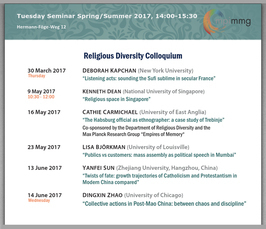"Poly-ontology: rethinking religious plurialism through a Chinese lens"
Religious Diversity Colloquium Spring/Summer 2017
- Datum: 19.06.2017
- Uhrzeit: 11:00 - 13:00
- Vortragende(r): David Palmer (University of Hong Kong)
- David A. Palmer is an Associate Professor and head of the department of Sociology at the University of Hong Kong, which he joined in 2008. A native of Toronto, he graduated from McGill University in Anthropology and East Asian Studies. After completing his PhD in the Anthropology of Religion at the Ecole Pratique des Hautes Etudes in Paris, he was the Eileen Barker Fellow in Religion and Contemporary Society at the London School of Economics and Political Science, and, from 2004 to 2008, director of the Hong Kong Centre of the French School of Asian Studies (Ecole Française d‘Extrême-Orient), located at the Institute for Chinese Studies at the Chinese University of Hong Kong. His books include the award-winning Qigong Fever: Body, Science and Utopia in China (Columbia University Press, 2007); The Religious Question in Modern China (University of Chicago Press, co-authored with Vincent Goossaert 2011; awarded the Levenson Book Prize of the Association for Asian Studies); and Dream Trippers: Global Daoism and the Predicament of Modern Spirituality (University of Chicago Press, co-authored with Elijah Siegler, 2017).
- Ort: MPI-MMG, Hermann-Föge-Weg 12, Göttingen
- Raum: Conference Room

For more details please contact vdvoffice(at)mmg.mpg.de.
In this talk, David Palmer questions the notions of religious “syncretism”, “hybridity” and “pluralism” as applied to China. China has never known the monopoly of a single religion, and the coexistence of a plurality of traditions has, for centuries, constituted an official principle of religious management, for the state as well as for religious institutions themselves and local communities. At an institutional level, this pluralism does not entail the freedom and mutual tolerance of independent entities, nor is it a syncretistic merging or hybridization, but the interpenetration, imbrication and functional differentiation of cosmological systems and practices that maintain their internal coherence and identity – and which are, at an ontological level, often radically incommensurable. This logic operates in the relationships between the “three teachings” of Confucianism, Taoism and Buddhism; between these traditions and popular religion; as well as, in the contemporary period, for the relationships between these traditions and the Marxist atheism of the socialist state. Taking inspiration from the “ontological turn” in anthropology, David Palmer uses ethnographic examples on Chinese popular religion, salvationist movements and state-religion relationships, to model different logics of “poly-ontological” imbrication in the Chinese world.